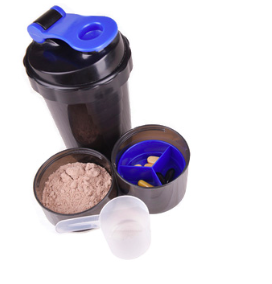Resistant Starch: Super-Carb for Body Composition!
With an overwhelming amount of research demonstrating its benefits, ‘resistant starch’ blows away many of the sexier sounding supplements that ...

With an overwhelming amount of research demonstrating its benefits, ‘resistant starch’ blows away many of the sexier sounding supplements that ...
Is marketing B.S & deceptive food labelling costing you your health & slamming the breaks on your progress? We give ...
If you look on the back of a vitamin or food package you will see that ingredients are rated as ...
You have also likely heard of ‘HMB’ which is a derivative of leucine. In fact the above pathway requires that ...
What foods have resistant starch? There are 4 types of RS (resistant starch). Unlike most other ingredients, resistant starches are ...
Why Should You be eating Resistant Starch? RS is a starch that when digested in the large intestine, leads to ...
Building the Perfect Beast - How Our Fast and Slow Twitch Muscle Fibers Determine Athletic Success...
Grocery shopping with health and fitness in mind can be a hassle. That is why in order to to minimize ...
Post-training is your most insulin sensitive time of day and the time when your body can use carbs the most ...
The first thing to discuss here is what it really is to lose 10lbs of pure fat. Most people lose ...
There are essential fatty acids, and there are essential amino acids, but there are no essential carbohydrates – our body ...
For all of us trying to reach the full potential of our health, it is important to be sure that ...
 Without enough focus, drive, and energy, the workout intensity needed to pound muscle fibers into submission cannot be generated. To ensure this critical training triumvirate is available for each and every session, it is imperative that the right raw materials be consumed ahead of time. Many, in their quest to maximize training intensity, are turning to pre workout supplements to increase aggression and optimize training efficiency. One of the very best pre-workout energizers is tyrosine. A non-essential amino, it can be synthesized within the body or produced endogenously from essential amino acids. Tyrosine is an important precursor in the formation of dopamine, epinephrine, and norepinephrine — neurotransmitter chemicals critical to encouraging focus, drive, and energy — and aside from its involvement in the structure of almost every protein in the body, tyrosine assists in the functioning of organs responsible for manufacturing and regulating hormones, most notably the pituitary, thyroid, and adrenal glands.[8]
Without enough focus, drive, and energy, the workout intensity needed to pound muscle fibers into submission cannot be generated. To ensure this critical training triumvirate is available for each and every session, it is imperative that the right raw materials be consumed ahead of time. Many, in their quest to maximize training intensity, are turning to pre workout supplements to increase aggression and optimize training efficiency. One of the very best pre-workout energizers is tyrosine. A non-essential amino, it can be synthesized within the body or produced endogenously from essential amino acids. Tyrosine is an important precursor in the formation of dopamine, epinephrine, and norepinephrine — neurotransmitter chemicals critical to encouraging focus, drive, and energy — and aside from its involvement in the structure of almost every protein in the body, tyrosine assists in the functioning of organs responsible for manufacturing and regulating hormones, most notably the pituitary, thyroid, and adrenal glands.[8]
Functions
As an integral component of several important neurotransmitters, tyrosine indirectly aids the efficient communication between the brain and various branches of the nervous system to influence mood and activate a wide range of physical and cognitive processes.[9][10] Considered to be an all purpose amino, tyrosine’s functions are many and varied, but let’s now take a closer look at how this substance may help you to become mentally and physically superior in the gym.
Acute Stress
Tyrosine works best when the body is subjected to high levels of acute stress, making it the perfect adjunct to killer workout sessions.[8] Released into the blood whenever a person is under physical or emotional stress, the catecholamines prepare the body to cope with stress. Tyrosine has been shown to normalize catecholamine levels to optimize the extent to which we may endure, adapt, and overcome. This ability to improve cognitive functioning under conditions of stress is, among tyrosine’s multifarious effects, the most beneficial for individuals who partake in intensive exercise.
 In one study, soldiers were asked to perform a significant amount of exhaustive work over a five-day period in cold temperatures, at altitude (with a corresponding low oxygen intake), and with little sleep — during which their cognitive and physical functioning was put to the test. It was found that the tyrosine group – who received 2g of tyrosine per day – performed better relative to the placebo group.[2][4] Specifically, this group demonstrated greater endurance despite near continual stress.[11] Extrapolate this effect of tyrosine to an intense 45-minute training session and we have the makings of a great performance enhancer.
In one study, soldiers were asked to perform a significant amount of exhaustive work over a five-day period in cold temperatures, at altitude (with a corresponding low oxygen intake), and with little sleep — during which their cognitive and physical functioning was put to the test. It was found that the tyrosine group – who received 2g of tyrosine per day – performed better relative to the placebo group.[2][4] Specifically, this group demonstrated greater endurance despite near continual stress.[11] Extrapolate this effect of tyrosine to an intense 45-minute training session and we have the makings of a great performance enhancer.
It is important to note that tyrosine is only effective upon acute activation of the stress response – when neurons are rapidly firing in response to an immediate stressor. When neurons are activated at normal rates, tyrosine has been shown to have few, if any, ergogenic effects on performance.
Exercise in the Heat
 Given the central role dopamine plays in thermoregulation, it comes as no surprise that tyrosine, an important precursor to dopamine production, boosts athletic performance when working in the heat.[7] A team of researchers found that by increasing dopamine levels in the brain via tyrosine supplementation, tolerance to heat during exercise and exercise performance in the heat were improved.[7] It was concluded that tyrosine had a clear ergogenic effect in combating fatigue when training in hot weather (30C or higher). Still, we should mention that the dosages used for this experiment were extremely high, so the results may not be all that relevant to the average user.
Given the central role dopamine plays in thermoregulation, it comes as no surprise that tyrosine, an important precursor to dopamine production, boosts athletic performance when working in the heat.[7] A team of researchers found that by increasing dopamine levels in the brain via tyrosine supplementation, tolerance to heat during exercise and exercise performance in the heat were improved.[7] It was concluded that tyrosine had a clear ergogenic effect in combating fatigue when training in hot weather (30C or higher). Still, we should mention that the dosages used for this experiment were extremely high, so the results may not be all that relevant to the average user.
Thyroid Function
 Without an optimally functioning thyroid gland, the metabolism becomes disrupted. Of the two major conditions associated with a poorly functioning thyroid, hypothyroidism (a.k.a. underactive thyroid) causes those afflicted to become mentally and physically sluggish, due in large part to a decrease in metabolic rate. Interestingly enough, bodybuilders – in particular younger lifters – are particularly susceptible to hypothyroidism because of their propensity towards extended and exhaustive training techniques.[3] Tyrosine is intimately involved in the production of thyroid hormone, therefore, tyrosine supplementation may prove useful in preventing or alleviating training induced hypothyroidism.
Without an optimally functioning thyroid gland, the metabolism becomes disrupted. Of the two major conditions associated with a poorly functioning thyroid, hypothyroidism (a.k.a. underactive thyroid) causes those afflicted to become mentally and physically sluggish, due in large part to a decrease in metabolic rate. Interestingly enough, bodybuilders – in particular younger lifters – are particularly susceptible to hypothyroidism because of their propensity towards extended and exhaustive training techniques.[3] Tyrosine is intimately involved in the production of thyroid hormone, therefore, tyrosine supplementation may prove useful in preventing or alleviating training induced hypothyroidism.
Usage Guidelines
Although tyrosine is found in many high protein foods such as chicken, turkey, fish, and dairy and in plants such as avocados, bananas, almonds, and pumpkin seeds, obtaining tyrosine levels sufficient to enhance performance is difficult, and best done via supplementation.
Usual tyrosine dosage recommendations of between 500 to 1200 mg per day are thought to be beneficial for ensuring optimal performance under high stress conditions – though the first time user is advised to begin with 300-500 per day and build up from there.[9]
To support your neurotransmitter production and help your body perform at its best during high intensity workouts, be sure to include tyrosine in your pre-workout concoction.
References